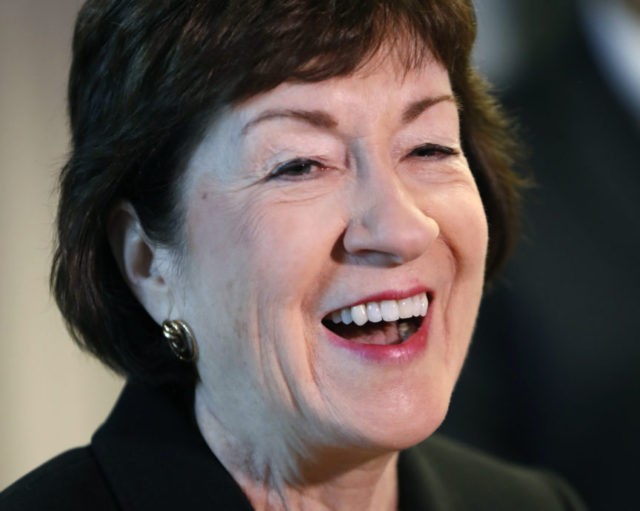PORTLAND, Maine (AP) — Backers of U.S. Sen. Susan Collins say they wish they could clone the moderate Republican powerbroker from Maine who has been a crucial swing vote in Congress as Republicans struggle to deliver on President Donald Trump’s legislative agenda.
Collins says she will decide during the Senate’s weeklong Columbus Day recess whether to stay in the Senate, where she has served for four terms, or again run for governor in Maine.
The Associated Press interviewed 10 of Collins’ current and former colleagues and staffers, along with Maine political observers. They said the senator is carefully weighing whether she can have more impact in the Senate or as a governor replacing the term-limited, Trump-allied Republican Gov. Paul LePage.
“I feel like that losing her in the Senate is losing the only existing bridge between the Democrats and Republicans that is there,” said Michael Bopp, who has worked as legislative director and counsel to Collins.
Her ability to cross the political divide has raised her national prominence and bestowed upon her nearly unmatched political leverage, said Bobby Reynolds, who worked for Collins for seven years and served as political director for her 2014 re-election campaign.
First elected in 1996, Collins now ranks as the 15th most senior senator in Congress and the most senior Republican woman senator, with key roles on the Appropriations Committee and the Intelligence Committee investigating Russian meddling in the 2016 presidential election.
“In a seat that’s so narrowly controlled by Republicans, she’s obviously in the center of every important issue and will be for some time,” said Bob Tyrer, who met Collins in 1975 on former Republican Sen. Bill Cohen’s staff and served as her campaign manager for her 1996 win.
Collins’ influential role was on display weeks ago, when Senate Republicans abandoned their attempt to kill Democratic President Barack Obama’s health care law after opposition from Collins and fellow Republican Sens. John McCain and Rand Paul.
But such centrist moves also have drawn attacks from Republicans like LePage, who’s blasted the senator for working against Trump, as well as progressives lambasting her for supporting the confirmation of Jeff Sessions, a former Senate colleague, as attorney general.
“I know there are people on both ends of the political spectrum that aren’t happy with me,” Collins told WCSH-TV last week. “That’s what happens when you are in the center. There are going to be people who aren’t pleased with your vote or your positions.”
Still, she is popular among Republicans and Democrats in the Senate, and even health care proposal co-author Sen. Bill Cassidy said he had no hard feelings toward Collins. He said she had “fingerprints all over” the proposal, often offering her advice despite her opposition to the final product.
“She has a moral fiber that is just strong and positive,” he said. “So either direction she goes, she’ll be a credit to either Maine and to the statehouse or the Senate.”
But Collins has said she’s feeling a strong pull from her constituents in Maine, where her family runs a fifth-generation lumber business in Caribou. She’s often recalled her childhood plucking potatoes from cold dirt during the harvest break for 30 cents a barrel.
“I really love being in Maine,” she told WCSH. “Going back and forth each week is difficult, and my family and friends are in Maine.”
The senator already has thrown out potential campaign platforms, like Medicaid expansion or job creation in a state that’s seen a sluggish wage growth since the recession.
It’s an urge former Democratic governor and onetime U.S. Rep. John Baldacci can understand.
“Sometimes the frustrating part is that they’re more interested in Washington in not getting things done than they are in getting things done,” said Baldacci, who served four terms in Congress. “There’s a sense at the state level that you’re in charge of your own destiny.”
Supporters of Collins said they hope she can bring her measured conservatism to an increasingly purple state led by firebrand governor LePage, known as a sharp departure from the even-keeled Maine brand of leadership dating as far back as Republican U.S. Rep. and Sen. Margaret Chase Smith.
“I think there’s been a very dire cloud over the state of Maine in government since frankly 2010 when Paul LePage came to office,” said Lance Dutson, a Republican communications consultant who has served on Collins’ campaign team. LePage took office in 2011. “There’s been a lot of conflict, and there’s been very little actual public policy progress in this time.”
Former Republican state Sen. Phil Harriman, a political analyst, said a few Maine Republicans have held off announcing runs depending on a decision by Collins, seen as a favorite to keep Republicans in the governor’s mansion. If her Senate seat became empty, it could be tough for Republicans to keep it, Harriman added.
Collins unsuccessfully ran for governor in 1994, becoming the first woman nominated for the office in Maine by a major party. If she were to win the 2018 race, she’d become Maine’s first female governor. Maine constitutional law expert Marshall Tinkle said she wouldn’t have to resign to run and could pick her successor after being sworn in.
Despite the lure of staying in the Senate, there are signs Collins is seriously mulling a gubernatorial run: An internal poll from the Collins circle recently leaked to Democratic political consultant David Farmer shows the senator wielding strong support across the state in a Republican primary.
Ted O’Meara, a former Maine Republican Party chairman who worked with Collins for former Sen. Cohen, said Collins would “decimate” the field if she ran. But he joins the chorus of supporters hoping she decides to stay in Washington.
“Common sense and decency are hanging by a thread in Washington these days, and she’s one of the people who’s holding it all together,” O’Meara said.

COMMENTS
Please let us know if you're having issues with commenting.